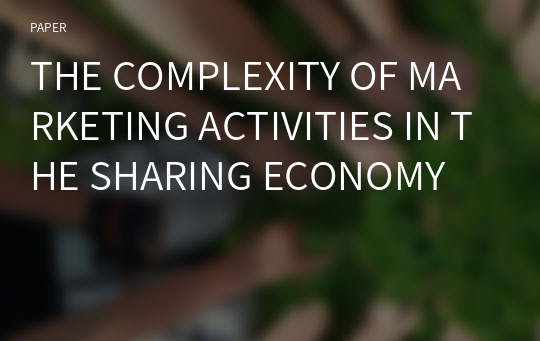THE COMPLEXITY OF MARKETING ACTIVITIES IN THE SHARING ECONOMY
* 본 문서는 배포용으로 복사 및 편집이 불가합니다.
서지정보
ㆍ발행기관 : 글로벌지식마케팅경영학회(GFMC)
ㆍ수록지정보 : Global Marketing Conference
ㆍ저자명 : Nikolaos Pappas
ㆍ저자명 : Nikolaos Pappas
영어 초록
Marketing in the sharing economyThe shift on the enhanced complexity of customers‟ needs has created a new business model termed as the sharing economy emerging through the traditional B2B2C sector, and substituted with micro-entrepreneurs who act as service providers (Kumar, Lahiri, and Dogan, n.d.). The importance of the sharing economy is based on the fact that in a short period of time it has managed to disrupt well-established fields (i.e.: taxi and accommodation industry), through the provision of low-cost convenience without the ownership responsibility (Eckhardt & Bardhi, 2015). In general, the sharing economy service providers are not responsible for marketing and promotional aspects since this is an aspect taken care of the service enablers (i.e.: Airbnb). In the sharing economy, marketing needs to focus on the development of early adopters, meaning younger generations (Laciana & Rovere, 2011), since they are the largest generational cohort, and are expected to remain the largest one for the forthcoming decades (Fry, 2016), whilst they have a considerably lower spending capacity than older people (Henderson, 2016). Therefore, younger generations select cost-efficient options and engage in utility-based brand switching (Kumar et al., n.d.). As a result, sharing economy marketing strategies mainly focus on apps or websites where their existing customers may visit (McAlone, 2016). Moreover, multigenerational marketing is considered as a rational segmentation strategy for service enablers (Eckhardt & Bardhi, 2015), since the older a generation is the lower the general adoption rates in sharing economy marketing (Hall & Krueger, 2015). Still, the complex decision-making of consumers in sharing economy‟s marketing is affected by several factors such as price and quality issues and the associated risks (Pappas, 2017). Despite the importance of sharing economy in modern business, the literature is silent on the complexity of aspects affecting the related marketing activities. The paper examines the complexity of marketing activities formulation examining peer-to-peer (P2P) accommodation holidaymakers in Athens, Greece. It specifically evaluates the impact of risks, price and quality issues, and social aspects, on P2P accommodation marketing activities, also including the socio-demographics of age and income. The research contribution is in both, theoretical and methodological domains. In terms of literature the study provides an understanding of the complexity formulation of marketing activities, with special reference to the sharing economy. Methodologically-wise, the research implements fuzzy-set Qualitative Comparative Analysis (fsQCA), which is considered new to the study of tourism and hospitality (Pappas & Papatheodorou, 2017). It further compares fsQCA suitability with regression, which is the dominant correlational mode of analysis.
Study tenets
In service industry research the term „tenet‟ is used to describe testable precepts able to identify complex conditions (Papatheodorou & Pappas, 2017). This study has formulated six tenets: (T1) The same attribute has the ability to determine a different decision for marketing activities depending on its configuration with other attributes (T2) A complex configuration with at least two simple conditions can leads to an outcome condition that can have a consistently high score (Recipe principle) (T3) Complex configurations can influence the marketing activities for P2P holidaymakers (T4) When the combinations differ on the simple conditions of configurations, they can influence in a positive or negative manner the marketing activities for P2P holidaymakers (T5) Sufficient marketing activities do not always result in a high outcome score (Equifinality principle), and (T6) When the Y scores are high, a given recipe for the marketing activities is not relevant for all cases.
Complexity in tourism
Complexity theory focuses on complex systems with nonlinear dynamics, characterised by self-organisation, emergence, and evolution (Arévalo & Espinosa, 2015). The theory is used to evaluate the nonparametric, and dynamic processes of complex phenomena in several different disciplines (Olya & Al-ansi, 2018). Tourism complexity is based on several conflicting elements, such as the translocal relationships and multilocality, the heterogeneity of actors, the places and governance globalisation, and the extreme diversity of operations (Darbellay & Stock, 2012). Moreover, tourism deals with complex policies involving multiple actors, and a perpetually changing multi-level coordination in a local, national and international level (Lai, Hsu, and Wearing 2016). The degree of behavioural complexity renders Newtonian (linear) thinking inadequate and highlights the necessity for nonparametric (nonlinear) research (Laws & Prideaux, 2005).
Method
The study was held in Athens, Greece in adult P2P accommodation holidaymakers. Following the study of Pappas (2017), structured questionnaires were distributed to the P2P rentals, asking from the holidaymakers to fill them in during their stay. As Akis, Peristianis and Warner (1996) suggest, the study‟s sample size should have a minimum of 95 percent level of confidence and a maximum of 5 percent statistical error, whilst the most conservative response of 50/50 (meaning half of the respondents would express positive views and the other half negative ones) was adopted. For N>20, t-table defines cumulative probability (Z) in 1.96 level. Following Akis et al. (1996), the sample size calculation is:
Rounded to 400
In total, 712 useful responses were collected, generating a statistical error of 3.67 per cent. The questionnaire consists of 24 Likert scale statements adopted from previous research, including two socio-demographic questions (age; income). The study employed fsQCA for the evaluation of complex configurations. fsQCA is considered a mixed method since it employs quantitative testing and qualitative inductive reasoning, and it is able to examine the potential complex relationships that have a bearing upon the outcome of interest, and identifies combinations of binary sets generated from its predictors. Since the research also estimated negated sets (presence or absence of a simple condition), the symbol “~” was used for the indication of an attributional absence. Research calibration was made by using 42 randomly selected individual cases. For the evaluation of the marketing activities „f_ma‟ affecting holidaymakers, the calibrated fuzzy-sets used were „f_a‟ for age, „f_i‟ for income, „f_r‟ for risks, „f_sa‟ for social aspects, „f_pi‟ for price issues, and „f_qi‟ for quality issues.
Results
Three sufficient configurations emerged from the research. More specifically, the first solution (f_a*f_i*~f_r*~f_sa*f_pi*f_qi) concerns the price-quality nexus, the second configuration (f_a*~f_i*f_r*~f_sa*f_pi*~f_qi) deals with price sensitivity, and the third one (f_a*~f_i*f_r*f_sa*~f_pi*f_qi) focuses on social interaction. The generated solutions for marketing activities are presented in the table below. The results indicate that all four simple conditions appear in at least one solution (T1), whilst at least two simple conditions are included in each sufficient configuration (T2). Moreover, the findings suggest that the solutions focus on: (i) price-quality nexus (ii) price sensitivity, and (iii) social interaction (T3). In addition, none of the simple conditions appears in all configurations (T4), and three different solutions seem to lead to the same outcome (T5). Finally, the coverage varies from .429 to .453, meaning that none of the solutions applies in all cases (T6). As a result, the findings confirm the six tenets of the study.
fsQCA versus regression
The study used a structural equation model for the examination of linear relationships, and implemented Confirmatory Factor Analysis (CFA), since the sum of the examined items is based on previous analytic research. Due to the large sample (N=712) χ2/df instead of χ2 was selected, since it is considered as a better estimate of goodness (Chen & Chai, 2007). Following Kline (2010), the research estimated the four most important fit indices: χ2=634.921, df=352, χ2/df=1.803 (acceptable value 0≤χ2/df≤2 [Schermelleh-Engel, Moosbrugger & Müller, 2003]), CFI=.902 (acceptable value is when CFI is close to 1.0 [Weston and Gore 2006]), SRMR=.782 (acceptable value is when SRMR<.8 [Hu & Bentler, 1999]), and RMSEA=.475 (acceptable value is when RMSEA<.5 [Browne & Cudeck, 1993]). In factor analysis, all values less than .4 were suppressed (minimum acceptable value .4 [Norman & Streiner, 2008]) in an effort to evaluate higher coefficients. In all constructs, the Average Variance Explained (AVE) was higher than .5 (minimum acceptable .5 [Kim, 2014]), and the convergent validity (CR) higher than .7 (minimum acceptable value: .7 [Huang, Wang, Wu, & Wang, 2013]). The Figure below explains the study‟s endogenous variables. The comparison of fsQCA with regression highlights that the latter cannot encapsulate the full range of alternative combinations, in restricts the presence/absence of a construct or socio-demographic in one outcome, whilst the row coverage in all sufficient configurations (also showcasing high consistency) is higher than the overall R2 (.393). As a result, fsQCA seems to be more efficient than regression concerning the examination of marketing activities on P2P holidaymakers, since it better presents the influence of the constructs under examination.
Managerial implications
The study offers a number of managerial implications. For starters, through the use of fsQCA, traditional accommodation providers and destinations can better understand complexity aspects of consumer trends, being able to sufficiently reposition their marketing activities. Moreover, fsQCA can assist on the clarification of the factors affecting marketing complexity in tourism and hospitality, and better promote and advertise the products and services in reference. The understanding of complex marketing patterns, can further lead to the formulation of competitive advantages and strengthen the competitiveness of the enterprises engaged in a destination, as well as the destination itself. In addition, destinations can better comprehend the complex evolution of sharing economy and build upon its strengths, aving the opportunity to formulate a cooperative market towards traditional establishments and P2P rentals.
Limitations
Despite the theoretical and methodological contribution of the study, several limitations need to be highlighted. The main limitation derives from the study‟s main strength, which is the limited application of fsQCA in tourism and hospitality. Much further use of fsQCA in the field could reveal its full potential. Another limitation deals with the examination of other groups, such as the holidaymakers selecting traditional establishments for their stay, P2P stakeholders, and destination authorities. Since different groups of respondents may produce different outcomes, any generalisation of the findings should be made with caution. Finally, if the research is repeated in some other destination or in later time, the focus of the generated complex configurations may alter. Therefore, the results should be carefully interpreted.
참고 자료
없음"Global Marketing Conference"의 다른 논문
 THE ROLES OF GREEN PACKAGING IN UGLY FOOD PURCHASE INTE..22페이지
THE ROLES OF GREEN PACKAGING IN UGLY FOOD PURCHASE INTE..22페이지 THE IMPACT OF INDUCED AWE ON ETHICAL TOURIST BEHAVIORS5페이지
THE IMPACT OF INDUCED AWE ON ETHICAL TOURIST BEHAVIORS5페이지 A BIBLIOMETRIC ANALYSIS OF SPIRITUAL TOURISM RESEARCH15페이지
A BIBLIOMETRIC ANALYSIS OF SPIRITUAL TOURISM RESEARCH15페이지 SOCIAL NETWORK ANALYSIS AND RESPONSE TIME TESTING: CONS..11페이지
SOCIAL NETWORK ANALYSIS AND RESPONSE TIME TESTING: CONS..11페이지 THE EFFECTS OF PARA-SOCIAL INTERACTION ON ONLINE CELEBR..3페이지
THE EFFECTS OF PARA-SOCIAL INTERACTION ON ONLINE CELEBR..3페이지 THE INFLUENCE OF OPINION LEADERS ON DAILY DEALS USER’S ..3페이지
THE INFLUENCE OF OPINION LEADERS ON DAILY DEALS USER’S ..3페이지 HOW IMMERSIVE RETAILING AFFECTS CONSUMERS’ URGE TO BUY:..6페이지
HOW IMMERSIVE RETAILING AFFECTS CONSUMERS’ URGE TO BUY:..6페이지 KEY TO SUPERSTARDOM IN A GLOBALISED MARKET: THE ROLE OF..6페이지
KEY TO SUPERSTARDOM IN A GLOBALISED MARKET: THE ROLE OF..6페이지 A POST-PANDEMIC LOOK AT TOURISTS’ PERCEIVED COOLNESS OF..4페이지
A POST-PANDEMIC LOOK AT TOURISTS’ PERCEIVED COOLNESS OF..4페이지 EXTRACTING OFFLINE RETAIL SHOPPING PATTERNS: OLLABORATI..5페이지
EXTRACTING OFFLINE RETAIL SHOPPING PATTERNS: OLLABORATI..5페이지


























